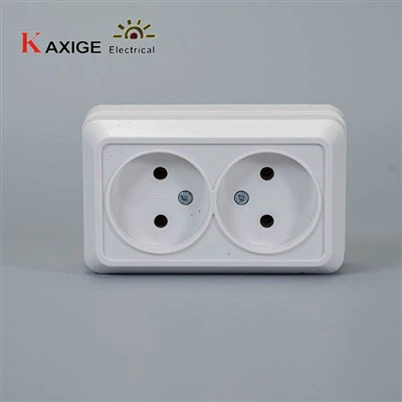Can I use a regular plug in a marine environment?
Leave a message
Can I use a regular plug in a marine environment?
As a seasoned plugs supplier, I often encounter inquiries from customers about using regular plugs in marine environments. This is a critical question that demands a comprehensive and well - informed answer. In this blog, I'll delve into the intricacies of using regular plugs in marine settings, exploring the potential risks, the unique requirements of marine applications, and the suitable alternatives we offer.
The Nature of Marine Environments
Marine environments are characterized by a set of harsh conditions that pose significant challenges to electrical equipment. First and foremost, there is the omnipresent saltwater. Saltwater is a highly conductive medium, and its corrosive properties can rapidly degrade the components of a regular plug. The salt in the water acts as an electrolyte, accelerating the oxidation process of metals. Over time, this corrosion can lead to loose connections, increased resistance, and ultimately, electrical failures.
Humidity is another factor to consider. Marine areas typically have high humidity levels, which can cause moisture to seep into the plug. Moisture inside the plug can lead to short - circuits, electrical shocks, and damage to connected devices. Moreover, the constant exposure to water spray, waves, and condensation further exacerbates the problem.
The mechanical stress in a marine environment is also more severe compared to a regular indoor or outdoor setting. Boats and ships are constantly in motion, subject to vibrations, impacts, and rough handling. A regular plug may not be designed to withstand these mechanical forces, and as a result, the internal wiring can become loose or damaged.
Risks of Using Regular Plugs in Marine Environments
Using a regular plug in a marine environment can have dire consequences. From a safety perspective, it poses a significant risk of electrical shock. Corroded or wet plugs can allow electricity to leak, endangering the lives of those on board. In addition, short - circuits caused by moisture or damaged components can lead to electrical fires, which are extremely dangerous in a confined marine space.
In terms of functionality, regular plugs are likely to fail prematurely in a marine environment. The corrosion and damage to the plug can disrupt the electrical connection, causing intermittent power supply to the connected devices. This can lead to malfunctions in essential equipment such as navigation systems, communication devices, and lighting, which are crucial for the safety and operation of the vessel.
Unique Requirements for Marine Plugs
Marine plugs are specifically designed to meet the demanding requirements of marine environments. They are built with corrosion - resistant materials such as stainless steel, brass, or special polymers that can withstand the corrosive effects of saltwater. These materials are chosen for their ability to resist oxidation and maintain their integrity over time.
Marine plugs also have enhanced waterproofing features. They are often sealed with gaskets and O - rings to prevent water ingress. This ensures that even when exposed to water spray or submersion, the electrical components inside the plug remain dry and functional.
In addition, marine plugs are designed to be more robust and durable to withstand mechanical stress. They have stronger housings and better - secured internal wiring to prevent damage from vibrations and impacts.
Our Suitable Alternatives
At our company, we offer a range of high - quality marine plugs and related products that are designed to meet the unique needs of the marine industry.
One of our popular products is the 8607 2 Gang Sockets Grounding. These sockets are built with corrosion - resistant materials and feature excellent grounding capabilities, which are essential for safety in a marine environment. The 2 - gang design allows for multiple devices to be connected simultaneously, providing convenience on board.
Another great option is the 2 Gang Extension Cord with Switch. This extension cord is specifically designed for marine use, with a waterproof and durable construction. The built - in switch allows for easy control of the power supply, and the 2 - gang design provides flexibility in connecting different devices.
We also offer the 8607 Telephone Socket, which is ideal for marine communication systems. It is designed to withstand the harsh marine environment, ensuring reliable communication on board.
Making the Right Choice
When it comes to choosing electrical plugs for a marine environment, it is essential to prioritize safety and reliability. While regular plugs may seem like a cheaper option initially, the long - term costs of using them in a marine setting can be much higher due to potential failures, safety hazards, and damage to equipment.
By investing in high - quality marine plugs, you can ensure the safety of everyone on board, the proper functioning of your equipment, and the longevity of your electrical system. Our products are rigorously tested to meet the highest standards of quality and performance in a marine environment.
Contact Us for Procurement
If you are in the market for marine plugs or have any questions about our products, we encourage you to reach out to us. Our team of experts is ready to assist you in finding the right solutions for your specific marine needs. Whether you are a boat owner, a marine equipment manufacturer, or a distributor, we can provide you with the best products and services. Start a conversation with us today to discuss your procurement requirements and take the first step towards a safer and more reliable marine electrical system.


References
- "Marine Electrical Systems Handbook" by Nigel Calder
- "Electrical Safety in Marine Environments" - A report from the International Maritime Organization
- Technical specifications and research materials from leading marine electrical equipment manufacturers.






